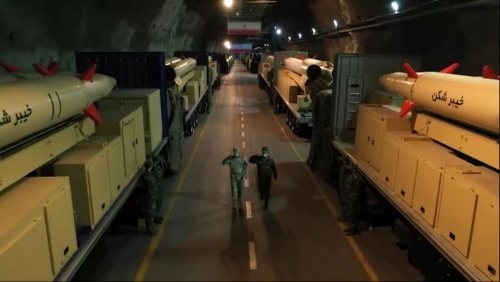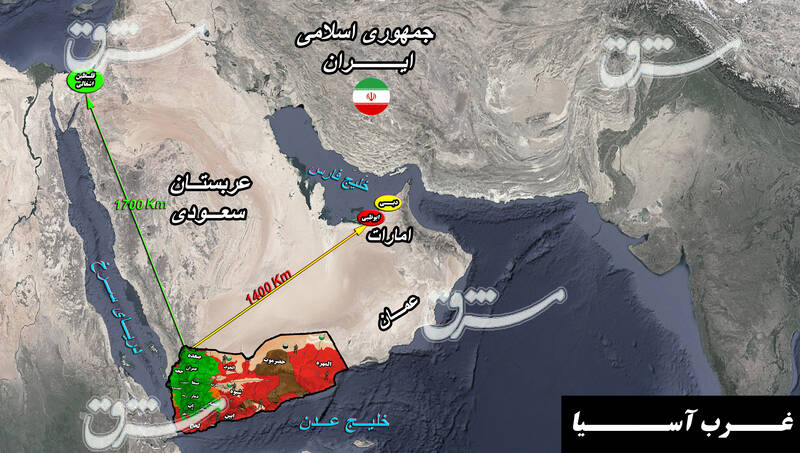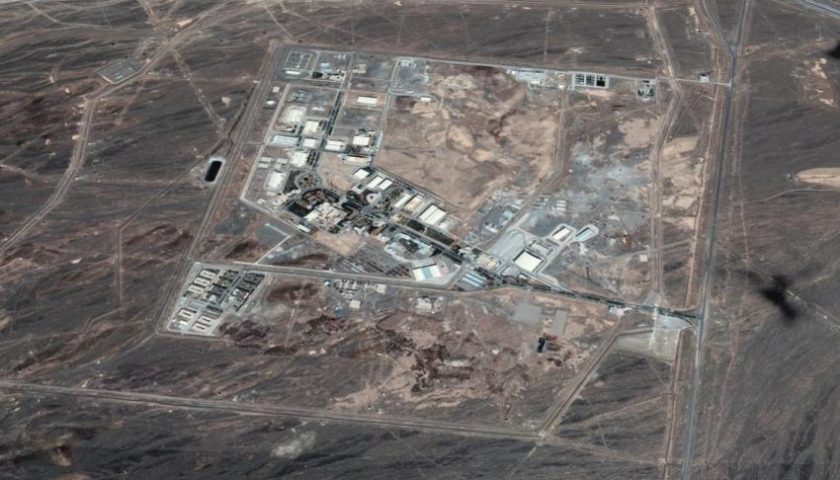The Resistance Axis Monitor News Bulletin delivers periodic rounds ups of important developments from Arabic, Hebrew and Persian sources that have not been covered or covered as extensively in Western reporting. While the bulletin focuses on Iranian regional intervention and its proxies in the Middle East, this coverage extends beyond to include politics, military, society and culture.
Afghanistan
IranWire Reports Afghan Officials Confiscate Iranian Materiel, IRGC Uniform in Taliban Base On 24 February, expatriate IranWire citing Afghan media reported that authorities confiscated Iranian materiel that included night vision goggle and IRGC uniform at a Taliban base in Adraskan County, western Herat Province. An unnamed Afghan official has confirmed the report to IranWire. (IranWire)
Iran
AFGS Chides Intelligence Minister Over Statement About Mole Involved in Fakhrizadeh Assassination On 16 February, the Armed Forces General Staff (AFGS), which is dominated by IRGC commanders, pushed back on Intelligence Minister Mahmoud Alavi’s allegation that a mole in the “armed forces” had primary role in assassination of military commander and nuclear scientist Mohsen Fakhrizadeh, saying that the person was fired during training in 2014-2015 due to drug addiction.
The statement added that because of the firing years ago, there was never any restriction on the Intelligence Ministry to conduct an investigation in the alleged mole. Alavi had earlier said that the ministry ran into restrictions because the alleged perpetrator was an “armed forces member.”
The General Staff called on Alavi to “be more careful in media statements” so to “not give an excuse to the criminal enemies of the system like America and the fake Zionist regime.” (Defa Press)
Iran, Russia Joint Drill in ‘North Indian Ocean’ On 16 February, Iran and Russia started a joint naval exercise in what Iranian media described was “North Indian Ocean” (Arabian Sea) to boost “naval security” in the area. Artesh Navy and some IRGC Navy units participated in the drill. India also sent some warships toward the end of the exercise.
An editorial in IRGC weekly Sobh-e Sadeq praised the drill, saying that China was interested in joining but was unable to because the drill’s delay coincided with Chinese New Year. Editorial added that Oman has previously participated in joint naval drills with Iran as well. “There are whispers about security cooperation to establish full security in this part of the world,” the editorial continued, “all of this must be compared with naval coalitions of countries hostile to the Islamic Republic in the past to better understand the importance of this” (Defa Press, Sobh-e Sadeq)
Sobh-e Sadeq Discusses IRGC ‘Political Doctrine’ On 16 February, IRGC weekly Sobh-e Sadeq began series of articles about the IRGC’s “political doctrine” to answer “accusations from foreigners” and “counter-revolutionaries.” The first article discusses broad framework of 12 principles rooted in “realism” and revolutionary principles. The 12 principles include “guardian-centeredness” [loyalty to Supreme Leader], duty, wisdom, strength, commitment to revolution, creating hope, “anti-Arrogance” [anti-Western], ethics, “maximum attraction,” and a coordinated, unified internal organization. (Sobh-e Sadeq)
Three MOIS Personnel Killed in Southeastern Iran On 17 February, the Islamic Republic Intelligence Ministry (MOIS) announced that three personnel were killed during operation against “an organized crime” group in southeastern Sistan and Baluchestan Province. (IRINN)
Self-Proclaimed Reformist Daily Linked to IRGC Accuses ‘Enemies’ of Spreading Rumors Against ‘Ayatollah’ Mojtaba Khamene’i On 13 February, daily Seday-e Eslahat, mouthpiece of a self-proclaimed Reformist faction linked to IRGC Intelligence, has accused “enemies” of spreading rumors against “Ayatollah” Mojtaba Khamene’i, one of Supreme Leader’s sons, referring to “latest rumor” that his son was just born in London. The daily says that Mojtaba, who’s name has floated as a successor to his father, has little security detail, unlike other children of officials, and is “more superb” than other children of elder Khamene’i because of his “simple” living. The article adds that “many clerics” approve of the religious qualifications of 52-year old “Ayatollah” Mojtaba. (Historically, clerics attain that rank by recognition from peers in more advanced ages). The daily says that “the enemy” fears Mojtaba because he is “most intelligent and has most superb record of presence in the fronts of the war against falsehood in his personal life.” The daily concludes that “he can truly be called an up-to-date and scientific Ayatollah.” (Seda-ye Eslahat)
Qalibaf Says Iran to join Eurasia Economic Union, But Union Official Says Accession Request Yet To Be Received On 16 February, Parliament Speaker Mohammad Baqer Qalibaf told Iranian media upon his arrival from Moscow that “preliminary steps” for Iran to join the Russia-dominated Eurasia Economic Union would begin soon. However, on 19 February, a union official said that there had yet been Iranian accession requests. (Defa Press, Financial Tribune)
Iraq
IRGC-Backed Iraqi Group Claims Attack on Turkish Forces, But No Confirmation Yet On 15 February, Iraqi As’hab Kahf (AK) released a video claiming to have targeted “Turkish occupying forces’ base” in Iraq. There has yet to be an independent confirmation of the claimed attack. Turkey has also not confirmed or responded to this claim.
Ankara signaled expanded operations in northern Iraq after Kurdish militants of People’s Worker’s Party (PKK) executed 13 Turkish military personnel and officers.
Formed in 2019, the paramilitary group’s name means Companions of the Cave, and refers to the Christian story of the Seven Sleepers of Epheseus that appears in the Koran.
Also on 15 February, IRGC-led, Iraqi Harakat al-Nujaba had released a statement threatening Turkey about military operations in Iraq’s Ninewa. Nujaba added that Turkish operations happen in the area because of the “weakness” of Baghdad’s position.
Later in the day, Saraya Awliya Ad-Dam, another recently formed group with IRGC branding, claimed rocket strikes in the vicinity of a US base near Erbil international airport, Kurdistan Regional Government (KRG). The attacks killed a Coalition contractor, who was not an American, and wounded a US service member and at least seven others including civilians.
“The American occupation will not be safe from our strikes in any inch of the homeland, even in Kurdistan, where we promise we will carry out other qualitative operations,” said the group, the name of which translates to Guardians of Blood Companies, in a statement. In a subsequent statement, the group also targeted Turkey, and Kurdish leaders.
In a statement, the Turkey Foreign Ministry said “These attacks [in Erbil] once again demonstrated the necessity of not allowing any terrorist organization to exist in the country’s territory and strengthening national institutions in an inclusive manner for the peace, stability and sovereignty of Iraq.”
An editorial in moderate-conservative Iranian Tabnak news agency opined that in addition to the US, the intended audience of the Erbil strike included Turkey and Kurdistan Democratic Party (KDP): “Erbil airport was chosen to signal Tehran’s dissatisfaction about actions of KDP, and it becoming too close to Turkey and other competitors of Iran.” The Tabnak editorial noted that the Erbil strike and AK’s claimed attack against Turkish forces are harbinger of “increasing tensions between Iran and Turkey in the coming months,” which was “predictable after [former President Donald] Trump’s exit and new makeup of forces in the region (Turkey growing closer to Saudi Arabia, and resolution of Qatar’s difference with the Persian Gulf Cooperation Council).” Tabnak cited Sabereen News Telegram channel (close to Iraqi resistance” that the Erbil rocket attack was a retaliation against Iraqi forces in Syria’s Albu Kamal.” It didn’t specify which strike, and could be referring to Israel’s attack last month.
On 21 February, Islamic Republic News Agency (IRNA) reported that PMF commander Abu Fadak al-Muhammadawi visiting Sinjar and deploying Popular Mobilization Forces (PMF) there was a clear signal that meant “end” to Turkish operations there. IRNA quoted Iraqi analyst Hedyar al-Barzanchi as saying that Turkey prefers PMF forces over KDP in Sinjar because it does not want Kurdish control over “silk road” that passed through Sinjar.
On 22 February, an editorial in IRGC weekly Sobh-e Sadeq speculated that Turkey would expand its operations in northern Iraq soon. (Twitter, Tabnak, Associated Press, IRNA, Washington Institute For Near East Policy, Sobh-e Sadeq)
Syria
At Least One KH Fighter Killed in US Airstrike in Syria On 26 February, Iraqi Kata’ib Hizballah announced that one of its fighters was killed and several wounded in US airstrike overnight in the vicinity of Syria’s Albu Kamal, close to the Iraqi border. Washington had announced the launch of the airstrike in retaliation for last week’s attack in Erbil.
Saraya Awliya ad-Dam, a relatively newer group that has adopted the branding of the Islamic Revolution Guard Corps (IRGC), claimed responsibility for the Erbil attack. In the Syria strike, the US specified that it was targeting Kata’ib Hizballah and Kata’ib Seyyed ol-Shuhada, prominent IRGC-led paramilitary groups that have sustained operations in Iraq and Syria.
Also on 26 February, an Islamic Republic of Iran (IRIB) reporter from Damascus announced that targets struck by the US lacked “operational value” and that 1 military personnel was killed, adding that “military officials in Syria” vowed “proportionate” response. The reporter says that strike was meant for domestic US consumption.
Iranian officials have yet to publicly comment on the airstrike.
The London-based Syrian Observatory for Human Rights, which has been suspected of grossly exaggerated casualty numbers in the past, has claimed that at least 22 were killed. Reuters citing “A medical source at a hospital in the area and several local sources” reported that 17 were killed. Reuters also cited “an Iraqi militia official” who said that one fighter was killed and four were injured.
Iranian and Syrian media reported that Foreign Minister Javad Zarif spoke with his Syrian counterpart on 26 February via telephone, reaffirming bilateral ties and Tehran’s commitment to support Syria in its “fight against terrorism.” The media readouts did not mention the US airstrike.
In a separate statement, the Syrian Foreign Ministry condemned the US airstrike and called on Washington to “change its hostile approach toward Damascus.”
In an interview with IRGC-linnked Tasnim News, Syrian National Security Committee Chairman Fa’ez al-Ahmad condemned the US for “targeting positions of Syrian army and its allies,” adding that the US attack showed support of Israel in its “attacks on Syrian territory.” He vowed that the attack would not “disrupt the firm will of Syria and its allies to drive American occupiers from Syria.” He also told Tasnim that “Syria has advanced weapons that could force Washington to reconsider before committing and repeating such actions.” The IRGC-linked news agency added that “this American attack coincided with increased ISIS activity in the Syrian desert and Washington transferring some ISIS leaders from paramilitary SDF prisons to America’s illegal base in At-Tanf.”
Furthermore, Tasnim News reported that Russian Senate international affairs chairman condemned the US strike in Syria for “causing tensions in Middle East and harming the beginning of normalizing process between Washington and Iran within framework of reviving nuclear accord.” (Shia News Agency, IRIB, Reuters, NBC News, Tasnim News)





